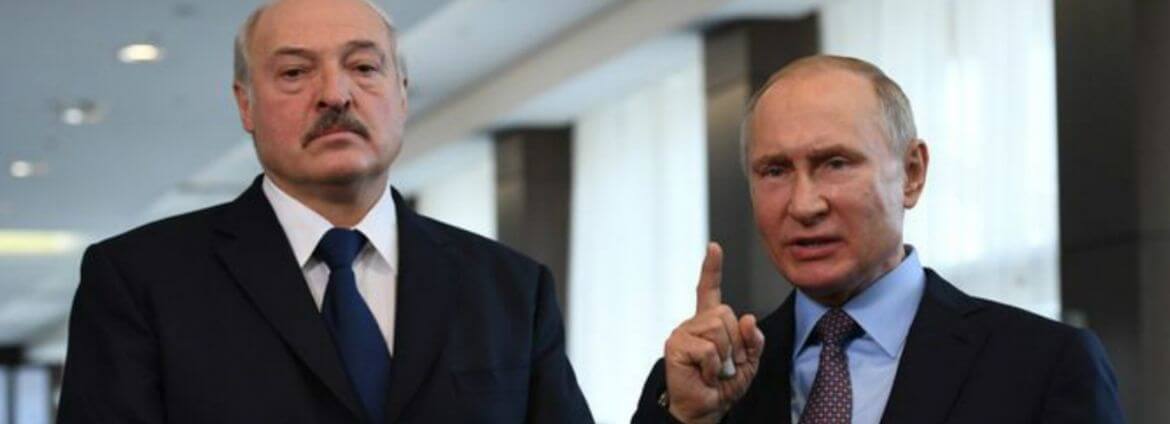- The migration crisis as a creation of the aggressive West
- In the name of their salvation, the West attacks Belarus
- Together against a common enemy!
- Close integration with Russia as a guarantee of survival
- Remnants of «multi-vector» foreign policy and the issue of Crimea
- The new constitution is a pig in a poke
The migration crisis as a creation of the aggressive West
The topic of the migration crisis on the border between Belarus and EU countries received active coverage in the fourth quarter of 2021. Pro-Kremlin websites presented Belarus as a victim of the aggressive and insidious designs of the West, which is attempting to unleash a regional or even global military conflict.
It is alarming that the «soft» version of the responsibility of the West (which, they say, destroyed prosperous Syria, Libya, and Iraq) has replaced the notion regarding the human-produced nature of the crisis, which is supposedly a part of the Western «hybrid» war against Russia and Belarus and, at the same time, a preliminary phase for the start of a full-scale invasion.
The thread of denying Minsk’s participation in unleashing the crisis continued, while months earlier the idea of the crisis as an effective tool to «punish» EU countries for their sanctions policy was quite popular. One propaganda resource points the finger at Soros:
«The accusation levied against Minsk of bringing in illegal migrants to storm the Polish and Lithuanian borders is absolutely false. This was done by the Soros migration mafia, which has already flooded Europe in other ways with millions of migrants hostile to it, seeking its social benefits and not respecting local customs.»
«If the European authorities ever recognize that the migration flow is the result of their own irresponsible actions, they will quickly be able to overcome the internal crisis in the EU. But it seems that they themselves are not interested in this,» Sputnik Belarus writes.
Another Sputnik publication echoes this sentiment, placing blame for migration flows on EU political approaches: «Any country that does not please the EU can become a target for thousands of illegal immigrants who want a ‘better life for their children.’ And Russia is no exception. Destabilization (or new sanctions) will be required, and this is when migration flows at the borders will appear.»
However, according to many propaganda stories, the West is already trying to attack Russia through the current migration situation in Belarus. For example, Ukraina.ru, owned by the Russia Today news agency, sees it as an artificial pretext for the West to impose new anti-Russian sanctions:
«Knowing that Russia will support Belarus as a partner in the union state no matter what, Brussels would not miss the opportunity to create a reason – unjustified – for the next expansion of anti-Russian sanctions, and therefore seeks to drag it into the story of the migration crisis through any means possible.»
RIA FAN, through the opinion of an anonymous user, promotes an unusual version of France’s role: «The user nsolvabulator noted that all immigrants are in the end sent to the UK. Therefore, it makes sense to ask if French President Emmanuel Macron is involved in the smuggling of people through his state.»
Meanwhile, the website Ukraina.ru saw the hand of Kyiv in the migration crisis: «According to American officials, Russia, taking advantage of the difficult situation on the border between Belarus and Poland, is allegedly preparing an attack on Ukraine. However, just the same, Kyiv will make use of the migration crisis in Eastern Europe.»
But even this, according to propaganda resources, is not so bad since the West is supposedly fanning a real war with Russia through the migration situation. «The Baltic countries and especially Poland are interested in the escalation of the situation on the eastern borders of the EU, and this makes a military conflict in the region all the more likely,» writes RuBaltic.
True, such an aggressive policy towards Belarus and Russia does not promise anything good for them, Imhoclub reassures readers: «In the medium term, if the Poles fail to change the Belarusian leadership, the EU will try to change the leadership of Poland. And for this, a ‘color revolution’ is not needed as in Belarus. It would be enough just to cut off European subsidies to them, through which Poland once became a showcase for the whole of Eastern Europe.»
At the same time, propaganda continued its favorite practice of comparing contemporary Western countries with Nazis and Fascists while accusing them of double standards. «Eurocrats still turn a blind eye to the system of humiliation and extermination of refugees organized by Eastern European EU members on their borders. Arrogant Europeans practice a religion of hypocrisy and double standards,» writes Imhoclub.
In the name of their salvation, the West attacks Belarus
According to pro-Kremlin websites, the collapse of the West is not a distant prospect, but a current reality. To stop the destructive processes, Western countries create an external enemy out of thin air and pounce on it reveal propaganda resources (hence the problems in Belarus, goes the big conspiracy).
«From the very beginning of the wave of sanctions, it was obvious that the Belarus issue was being used as a cementing factor in European political methods, allowing at least for a retouching of internal discord in the EU,» Sputnik Belarus explains.
Moreover, political «discord» is only part of the problem. Europeans are getting poorer and, it turns out, suffering from a shortage of goods, including paper:
«What is happening in this world with the seemingly rich, seemingly civilized who never knew what scarcity and lines were for the last eighty or so years? Globalism is simply dying.»
In the U.S., the situation is even more critical: «The country, which by inertia is called the first economy in the world, is on the verge of very real default. Discouraged Americans are frantically looking for ways to escape.»
Instead of recognizing internal problems and resolving them, Western countries prefer to create them for other countries, primarily for Russia. In the «anti-Russian» strategy, a special role is assigned to Belarus and Ukraine:
«They [the U.S.] will try to use the Ukrainian card for as long as possible to contain, demonize, and weaken Russia. No options for ‘exchanges’ (e.g., we give you Ukraine, and you give us a weakening of the Russian-Chinese alliance) are possible.»
Ukraina.ru develops this idea in relation to Belarus: «Naturally, the U.S. does not care about the fate of ordinary Belarusians, like the fate of the inhabitants of Afghanistan, and the only point of implementing foreign policy regarding Belarus is an attempt to turn it into a second Ukraine.»
As usual, the Telescope website provides readers with the most colorful description of what is happening:
«The fact is that all this is directed against Russia. And everything that is directed against Russia is like a balm for the soul for Western politicians. Russophobia is the Western value and one it imposes on other countries. It should be recognized that the modern Western Napoleons are very impressed by the militant cliques of Bandera, Polish-gentry, and Baltic evil spirits regarding their campaign against Moscow and the destruction of the Kremlin.»
Sometimes propaganda resources use outlandish arguments relative to people and movements they hate. Telescope, for example, criticizes «Ukrainian nationalists» from a racial point of view, calling them «enemies of the white race»:
«This is exactly how today’s Ukrainian nationalists act, who are in fact traitors to the white race. They are fighting against white Russian people in the interests of the globalists. And globalists, that is, the leadership of Western countries, are promoting a distinctly anti-white agenda – LGBT, BLM, and migrants. It turns out that Ukrainian nationalists are the enemies of the white race.»
Together against a common enemy!
Many propaganda stories did not forget to mention Alexander Lukashenko’s statements regarding the possibility of deploying Russian nuclear weapons in Belarus. «No one should forget that Russia is a nuclear power. And its nuclear guarantees also apply to allied Belarus,» reminds Imhoclub.
The more arrogant the «aggressive West» becomes, the more serious will be the reciprocal steps Minsk and Moscow take, explains EADaily:
«The geopolitical situation around Belarus and Russia continues to become more and more aggressive towards the two allied states. Sanctions pressure, Russophobia, incessant accusations of various kinds, as well as the increased presence of the American military in Eastern Europe under the cover of NATO — all this and much more is pushing Minsk and Moscow to take retaliatory steps.»
EADaily even prepared for Belarus the Cuba’s role in the framework of a hypothetical nuclear crisis in an article with the telling title «The world is on the verge of a new Caribbean crisis. What does Belarus have to do with it?»
The aggressive West will stop at nothing in its desire to destroy Russia, Sputnik claims: «NATO is calling for preparations for a long struggle with Russia, the world’s largest nuclear power and a permanent member of the UN Security Council, hoping for Russia’s natural collapse and an unclear future.»
Unlike the increasingly unpredictable hostile actions of the West, Russia retains its common sense and will place nuclear weapons in Belarus only if the situation continues to develop. «Once again, it is worth emphasizing that such a step will be possible and justified only in the event of a real deployment of nuclear weapons in Poland,» predicts Ukraina.ru.
In taking the initiative to accept Russian nuclear weapons, Belarus thereby not only helps Russia, but also protects China, explains Imhoclub: «Therefore, Lukashenko talks not only about an outpost of Russia, but about an outpost of Eurasia. Surprising as it may seem to Radio Liberty, today we are also defending the interests of the PRC.»
Close integration with Russia as a guarantee of survival
One of the traditional messages from pro-Kremlin media is the assertion that there is absolutely no alternative to Belarus’s development without close integration with Russia (or even as a part of it). These claims took on a new breath in connection with the signing on November 4 of a secret package of integration agreements between Belarus and Russia.
«The signing of 28 programs has become a visible manifestation of the state’s will for union building. That the potential of the Union’s economy is far from realized suggests that the limits of its growth are not even visible yet and that we are only at the beginning of the journey,» writes Sputnik Belarus.
Interestingly, the topic of close integration with Russia is intertwined with Western sanctions in most publications, as if this is the last weighty argument to give integration its most decisive impetus.
«Belarus is catastrophically late with integration. This is the only escape from inevitable sanctions,» says Sonar2050. As is clear, sanctions are presented as an evil from which Belarus needs to be saved. From a column in Sputnik Belarus, it follows that Western sanctions are even useful, since they benefit Eurasian integration: «External sanctions have become a significant incentive for Eurasian integration.»
The positive effect of Western sanctions for the rapprochement of the two countries was also cited by Imhoclub:
«We have something to respond with to economic sanctions. The same Poles who threaten to block the border will also receive damage from them. The close convergence of the economies of Belarus and Russia will help us overcome the consequences of these sanctions. Western pressure brings us closer, helps us to understand each other as much as possible, to find common solutions. This was precisely what was seen in Alexander Lukashenko’s interview with Dmitry Kiselev.»
We need to deepen integration with Russia right here and now, as further delay will be disastrous, Imhoclub writes with urgency:
«Without the Union with Russia, this model is not viable, because we are co-dependent cooperatively. That is why now the fundamental task is to build effective economic integration with the Russia precisely in the interests of the social state and path.»
The topic of sanctions also allowed propaganda websites to make fun of Western countries: they can’t even impose sanctions normally, and the more they try to isolate Belarus, the greater the reverse effect.
«The words of a famous song from a Soviet movie come to mind: «Whatever they do, things don’t work out.» They lobbied for sanctions against Belarus and increased imports of Belarusian products. They declared a boycott of the nuclear power plant and ended up increasing imports of Belarusian electricity,» RuBaltic notes optimistically.
Remnants of «multi-vector» foreign policy and the issue of Crimea
Pro-Kremlin media continue to be perplexed by the lack of unequivocal recognition of Crimea as Russian by Minsk and the remnants of its independent foreign policy. They fear that Lukashenko is in this way leaving open the opportunity to restore relations with the West.
«Minsk still hopes to establish a dialogue with the West, which national authorities have repeatedly emphasized over the past year. In this case, the non-recognition of the status of Crimea serves as a signal that the country is still looking not only to the east,» writes Ukraina.ru.
Pro-Kremlin media received Lukashenko’s statements on Crimea with skepticism and expect him to travel to the peninsula: «The trip to Crimea was listed as a key moment of the election campaign – Crimeans should be aware that in Belarus they want to hear from the authorities official recognition of the Russian status of the peninsula.»
The Regnum website has traditionally taken the toughest stance with its theory of «Lukashenko’s departure to the West» and his cooperation with «nationalists»:
«The story of TBM and its Novoe Vremya, like the incidents with Yuri Voskresensky and Roman Protasevich, is a kind of invitation to all nationalists to cooperate.»
RIA FAN also suspects Lukashenko of duplicity: «When, finally, will Belarus turn around to face its friends and stop demonstrating the notorious multi-vector approach, which some observers call promiscuity?»
Ukraina.ru also reproaches Belarus for being too «multi-vector»:
«In Belarus, moreover, there is Lukashenko with his coveted multi-vector approach, which, judging by cooperation with Ukraine for the sake of the West, he is very, very reluctant to part with. Therefore, as always, he sees in it a lever of pressure on Russia to squeeze out additional preferences for his nation.»
«Teleskop» is even more unequivocal in its assessment: «Lukashenko is sabotaging real integration. He makes promises but does nothing.»
At the same time, the detention in Belarus of Komsomolskaya Pravda correspondent Gennady Mozheiko, in addition to the Zapad 2021 exercises, received only fragmentary coverage on propaganda resources.
The new constitution is a pig in a poke
There is no well-coordinated assessment of constitutional “reform” in Belarus among pro-Kremlin media. Several (pro) Russian activists consider its norms to be insufficiently pro-Russian, especially because of the lack of mention of the Union State. In general, many media resources are skeptical about the results of changes in the constitution.
«According to several analysts, no global changes should be expected if constitutional reform in Belarus is completed,» writes EADaily.
Ukraina.ru is also inclined to believe that the constitutional process has not fundamentally changed the internal political situation in Belarus:
«The chosen tactics of completely suppressing the enemy allowed the nation’s leadership to remove protesters from the streets but did not reduce the degree of their discontent. Now opposition activity has gone underground, to kitchens and the internet, and it becomes much more difficult to control it. That is why threats at any moment should be expected.»
However, some pro-Kremlin resources are optimistic about the new constitution, and Imhoclub even dubbed it a «vaccine against revolutions»:
«Well, FOR THE CONSTITUTION! As a vaccine against revolutions… The developers of the new Constitution of the Republic of Belarus put forward the fruits of their intellectual work to a national referendum. That’s right – the people’s will under a dictatorship.»
Pro-Kremlin websites then disagree about the new constitution proposed by Lukashenko.
Материал доступен на русском языке: Вместе с Россией против западной агрессии










